WMG News - Latest news from WMG
WMG degree apprenticeships praised in University’s Ofsted report
 WMG at the University of Warwick's collaborative, industry-driven approach was noted in a recent Ofsted report, where the University was praised for its commitment to delivering high-quality and transformative degree apprenticeship programmes.
WMG at the University of Warwick's collaborative, industry-driven approach was noted in a recent Ofsted report, where the University was praised for its commitment to delivering high-quality and transformative degree apprenticeship programmes.
The inspection highlighted Warwick's dedication to fostering valuable learning experiences across its degree apprenticeships, which are provided by key departments including WMG, Warwick Medical School; the School of Engineering, the Department of Computer Science, and the Centre for Lifelong Learning.
Warwick's approach was praised by the Ofsted inspectors, who found that the training offered aligns closely with local, regional and national skills shortages.
Professor Rob Thornton, Associate Dean Undergraduate Programmes, at WMG said: “On behalf of the entire team, I’m thrilled that the inspectors have recognised the strengths of the University’s degree apprenticeships, with over 60% based here in WMG, spanning Engineering and Digital Technologies.”
WMG remembers Ratan Tata
Professor Robin Clark, Dean of WMG, comments on the passing of Ratan Tata

“Ratan Tata was a titan of business who will be remembered at WMG for his inspirational passion for engineering and design, and for his personal kindness, humility, and deep insight.
“A close friend of our founder, Lord Bhattacharyya, Mr Tata visited WMG, at the University of Warwick, many times.
“Whether opening the WMG Academy for Young Engineers in Coventry, meeting our researchers on materials and intelligent vehicles, laying the foundation stone for the National Automotive Innovation Centre, or meeting local engineering businesses to understand their capabilities, Mr Tata was always fascinated by the ways innovation and technology could improve lives and create opportunity, and always willing to give his time to speak to our students, researchers and industry partners about their work.
“WMG and Mr Tata’s partnership began during the development of the Tata Indica, India’s first domestically designed vehicle, with WMG researchers supporting the design and manufacturing of the groundbreaking car. This led to the opening of the Tata Motors European Technical Centre at Warwick and to many research and education partnerships across a wide range of industries, many of which continue to this day on our campus, including at the National Automotive Innovation Centre, helping to create jobs, develop technologies and strengthen communities.
“Mr Tata’s vision and leadership leaves an enormous legacy for Warwick, our region, the UK and the world.
We are greatly saddened by his passing, and our deepest condolences go to his family, friends and the entire Tata community.”
Ready, Set, Go! The University of Warwick and 62 Coventry schools unite for the Flame of Friendship Torch Relay
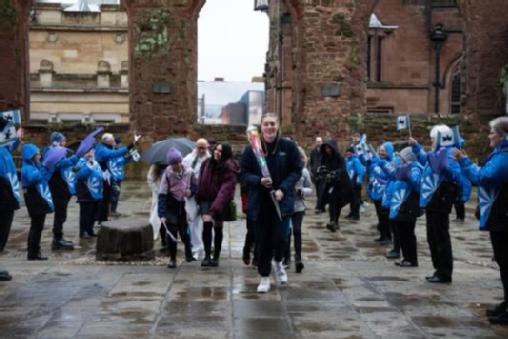 In anticipation of the Paris 2024 Olympics, The University of Warwick, in collaboration with 62 Coventry primary, secondary, and special educational needs schools, officially launched the Flame of Friendship Torch Relay on Thursday 22nd February.
In anticipation of the Paris 2024 Olympics, The University of Warwick, in collaboration with 62 Coventry primary, secondary, and special educational needs schools, officially launched the Flame of Friendship Torch Relay on Thursday 22nd February.
The torch relay kicked off with a spectacular launch ceremony at Coventry Cathedral, featuring a procession led by Team GB Water Polo player Amelie Perkins, who carried the torch to its first destination, Southfields Primary School.
As the relay unfolds, the torch will journey to 62 schools across Coventry, culminating in a momentous grand finale at the University of Warwick on the 8th July.
The torch has been custom made for this event, following a competition in which over 2000 Coventry pupils took part. The winning design, from a Year 7 student at Finham Park School, was manufactured at WMG as a project done by four Rugby College students currently undertaking T Level-related activities with WMG.
Led by Rebecca Bollands, Deputy Head at Earlsdon Primary School, and supported by the Warwick Institute of Engagement on behalf of the University of Warwick, the Flame of Friendship Torch Relay aims to foster unity and collaboration among Coventry schools in the spirit of the upcoming Olympic Games.
Kerry Baker, Associate Director at the Warwick Institute of Engagement said “I’m so proud of all the people that have had a hand in making the Flame of Friendship a real, physical thing – taking ideas and solutions from the brains of 12- to 50-year-olds and combining them to make something so unique, so stunning, and so representative of Coventry. It’s an honour to be able to support our community in such a fun and once-in-a-lifetime experience.”
At the Finale on Monday 8th July, over 1000 Coventry pupils and teachers will line the road on the University of Warwick campus and join a procession as the torch passes by, making its way along the final relay leg to Butterworth Hall at the Warwick Arts Centre, pausing in the Piazza where members of the Royal Opera House will lead the participants in an Olympic themed dance.
For more information and to view the route of the torch visit our website.
ENDS
Media Contact
University of Warwick Press Office contact:
Kat Beauchamp, Communications Officer
Phone: 07880175408
Email: Katherine.beauchamp@warwick.ac.uk
Warwick’s Wonka explores the world of pure imagination
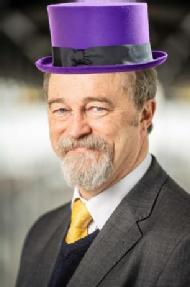 Professor of Visualisation, Alan Chalmers, an expert in flavour simulation at WMG at the University of Warwick, discusses the most famous creations of Willy Wonka ahead of the film premiere this December.
Professor of Visualisation, Alan Chalmers, an expert in flavour simulation at WMG at the University of Warwick, discusses the most famous creations of Willy Wonka ahead of the film premiere this December.
“While we may not have discovered the source of snozzberries, our research invites everyone to wonder about the extraordinary possibilities within the science of flavours” – Professor Chalmers.
Professor Chalmers is the creator of an exciting new flavour experience in a virtual way, with the opportunity to taste almost anything in a sip. The process takes samples of food for analysis, to accurately simulate a real flavour by extracting its tastes, aromas, and mouthfeel. His research has placed him as Warwick’s Willy Wonka.
“We can take a person on a journey through the vast flavour space from the start flavour to a variant that they enjoy”.
Three-course meal bubble-gum:
“Flavour is just the sensation of the taste, aroma and mouthfeel of food or drink in your mouth. If you take the real food or drink and analyse them to extract these components – then they can simply be authentically simulated with UK Food Standards Agency food-safe chemicals.
“So, you take a fork full of roast turkey, gravy, Brussel sprouts and a bit of roast potato … and analyse it with specialist devices to extract exactly what the taste, aroma and mouthfeel components are for this food ensemble. Once you have this “recipe” you simply recreate this exact flavour with the food-safe chemicals – with a specific food-safe chemical for each component, for example, sucrose is used to simulate the sweetness component.
The correct combinations of these chemicals can then be embedded in chewing gum … and voila – as you bite down on the chewing gum – you will experience the same flavour – as if you just had eaten the real roast turkey, gravy, Brussel sprouts and roast potato.”
Lick-able Wallpaper:
“This would be quite straightforward to do. You simply need to embed the food-safe chemicals for each of the components of the desired flavour into the wallpaper – and as it is licked – so the flavour will be perceived.”
The Everlasting-gobstopper:
“I could imagine a ball of eg hard plastic which is impregnated with a sweet flavour. The sweet won’t get smaller - but at some point the sweet flavour will have to be replenished. This will depend how often the gobstopper is sucked and how hard! I could imagine the centre of the plastic ball contains the liquid and this is drawn out as the person sucks. The liquid could be replaced when required.
“Not sure it is a sweet I would want – I think I will stick to chocolate!”
ENDS
Notes to editors
For further information please contact
Bron Mills
bron.mills@warwick.ac.uk
07824540720
The technology was not originally created with inspiration from the infamous chocolatier. The theory behind the invention is that changes in a person's taste and smell senses could be an early indication of Alzheimer’s before signs of memory loss arise. The easy-to-use low-cost dispenser could be used by a nurse as part of an annual health check, in pharmacies, care homes, community centres and even in the home. Researchers hope to achieve UK-wide screening services where members of the public can take a simple smell and taste test. Those who perform poorly can then be referred for further tests which could result in an Alzheimer’s diagnosis.
Professor Chalmers said: “At the moment, people who present with symptoms of memory loss are referred for MRI scans and spinal fluid tests to confirm a diagnosis. By the time memory loss occurs, things are often too late; pioneering drug treatments only perform well in the early stages of degeneration.
WMG alumnus appointed Honorary Fellow at the University of Warwick
WMG at the University of Warwick’s MSc Engineering Business Management alumnus, Kanishka Arumugam, has been appointed as an Honorary Fellow at the University’s Institute for Global Sustainable Development (IGSD).
Kanishka Arumugam is Co-CEO of EKKI Water Technologies, his family’s business, based in Coimbatore, India. The company efficiently and sustainably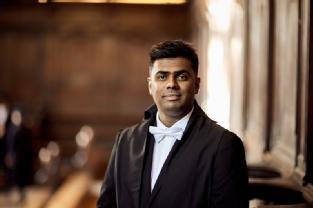 pumps and transports water for agriculture, building services, and utilities, exporting its products to more than 20 countries.
pumps and transports water for agriculture, building services, and utilities, exporting its products to more than 20 countries.
As part of his commitment to sustainable innovation, he is the driving force behind the first wastewater joint venture in collaboration with HOMA, a renowned global wastewater technology company.
Kanishka Arumugam also holds the distinction of being the youngest National Next-Gen President at the CII Family Business Network. He also serves as a Trustee in his family's educational institutions and actively engages in various advisory roles for international start-ups and institutions.
In his role as an Honorary Fellow, he will share his unique insights on how businesses can be a force for good; promote sustainability in the water industry; and support students in gaining a broader understanding of entrepreneurship and sustainable global development.
Professor Elena Korosteleva, Director of IGSD at the University of Warwick, commented: “We extend our warmest welcome to Kanishka to our Institute for Global Sustainable Development. We’re excited to have him bring a fresh perspective on sustainable development and bridge the gap between academia and business, particularly through his involvement with water and wastewater industry globally.”
Kanishka Arumugam, CEO of EKKI Water Technologies, added: "I am deeply humbled and honored by the privilege of being appointed as an Honorary Fellow at the University of Warwick, my esteemed alma mater, which ranks among the top 5% in the world.
“At Oxford University, I honed my leadership acumen and gained a deeper comprehension of human interactions, while the University of Warwick provided me with the resources for applied academia and instilled in me a passion for global competitiveness and sustainable development.
“My close interactions with the late Professor Lord Bhattacharyya and Professor Sujit Banerji at WMG have further emphasized, within the context of EKKI, the critical importance of sustainability and global competitiveness.
“Whenever I step onto the Warwick campus, I am inspired by the incredibly bright minds filled with curiosity and ambition. I eagerly anticipate contributing my best in the coming years within this unique learning environment alongside this brilliant faculty and state-of-the-art facilities."
Professor Steve Maggs, Director of Alumni and Industrial Engagement with Education at WMG said :“It’s great to see Kanishka supporting Warwick through the IGSD. Kaniskha’s remarkable achievements and commitment to positive change make him a fantastic ambassador for the University – this is a great example of the importance of maintaining a lifelong relationship with our former students and the positive opportunities those relationships can foster. Congratulations Kanishka!”
Other distinguished Honorary Fellows of the IGSD include esteemed members of the House of Lords, such as Baroness Sheehan and Lord Teverson. The University has a history of recognising accomplished individuals with connections to India, including prominent figures like Mr. Ratan Tata, the former Chairman of the TATA Group, Mr. Venu Srinivasan of TVS Motors, and Sir Ralf Speth, the former CEO of Jaguar Land Rover, all of whom have received Honorary Doctorates and Honorary Fellow titles from the University.
Find out more about the WMG Alumni community here: https://warwick.ac.uk/fac/sci/wmg/education/alumni/
Prime Minister Rishi Sunak visits University of Warwick for Horizon policy announcement
The Prime Minister visited the University of Warwick, on Thursday 7th September, where he announced the UK would re-join the EU’s flagship research scheme, Horizon.
The move means that UK-based researchers and innovators will be able to access funding from the £85 billion programme, in what has been widely hailed as a major boost for the higher education sector.
Rishi Sunak said it was the ‘right deal for the UK’ as he confirmed that the UK would be re-joining Horizon as an associate member.
The Prime Minister chose to make the major policy announcement at Warwick, which has a world-class reputation for science and innovation, and has close ties with research partners across Europe.
During the visit, he was given a tour of the university’s International Manufacturing Centre by Robin Clark, Dean of WMG, and Emma Flynn, the University’s provost.
Earlier, the Prime Minister had held a private conversation with university leaders, Sir David Normington (Chair); Professor Emma Flynn (Provost); Rachel Sandby-Thomas (Registrar), and Dr Chris Twine (Secretary to Council).
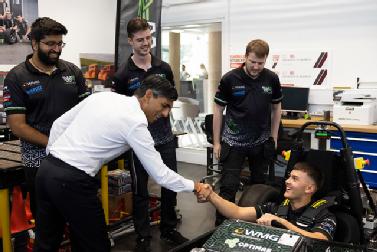 The International Manufacturing Centre – part of WMG - is one of the biggest buildings on campus, and at the heart of the University’s technological research and testing. A variety of projects have been undertaken with global companies to develop new products or improve processes at the centre.
The International Manufacturing Centre – part of WMG - is one of the biggest buildings on campus, and at the heart of the University’s technological research and testing. A variety of projects have been undertaken with global companies to develop new products or improve processes at the centre.
Professor Emma Flynn, the University’s Provost, said: “We were delighted to host the Prime Minister today and welcomed the opportunity to showcase some of the cutting-edge technology and innovation we have here at Warwick.
“The fact the Prime Minister chose to come to Warwick to make such a major announcement on science funding gives me a sense of enormous pride in our brilliant academics and researchers, who have built our reputation as a world-leading university on science, innovation and research over many years.
“The announcement today on Horizon funding is fantastic news for Warwick and the wider university sector and will help drive research excellence and collaboration with our partners.
“This deal will make help us address and make a positive difference to the environmental, economic, and social challenges we all face.”
Sir David Normington, chair of Council and Pro-Chancellor, added: “We were delighted to welcome the Prime Minister to Warwick, and are grateful for his interest in our work at the University. Today’s announcement is great news for everyone. Allowing our scientists to work together, irrespective of borders, is in all of our interests.
“As a former civil servant, I also recognise the hard work of the negotiating team who secured this deal in the background, and they deserve great credit.”
The UK will also associate to Copernicus, the European Earth Observation programme. This will provide the UK’s earth observation sector with access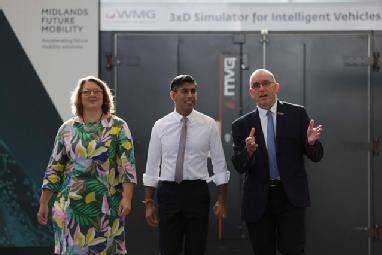 to unique data – valuable to helping with early flood and fire warnings, for example – and with the ability to bid for contracts, which they have not been able to access for three years.
to unique data – valuable to helping with early flood and fire warnings, for example – and with the ability to bid for contracts, which they have not been able to access for three years.
The University of Warwick is ranked as one of the world’s best universities, with 92% of its research rated as world-leading or internationally excellent.
University of Warwick hits the ‘gold standard’ in government teaching rankings
The University of Warwick's teaching has been rated ‘outstanding’ by the UK Government's Teaching Excellence Framework (TEF).
The University achieved the highest possible rating across all three categories for student experience, student outcomes, and for the overall assessment.
Out of 228 universities which took part in the TEF, Warwick was one of 26 to achieve the gold standard across all three. Warwick was one of only four Russell Group universities - including Oxford, Cambridge and Exeter - to achieve this.
It is the latest in a series of top ratings the University has been awarded over recent weeks.
The expert panel concluded that most student experience and student outcomes were of “outstanding quality”, including for students from under-represented backgrounds.
TEF is a national scheme run by the Office for Students (OfS) which aims to encourage higher education providers to deliver excellence in the areas that students care about the most: teaching, learning and achieving positive outcomes from their studies.
The ratings provide students and parents with an independent assessment of the quality of the education delivered by universities within these key areas.
The University has also demonstrated strong progress in closing the attainment gaps for students from disadvantaged backgrounds including those who might have not considered university an option for them in the past. Data from TEF showed better outcomes for students at Warwick from neighbourhoods where less people attend university, and those studying part-time, compared to similar groups of students at other universities.
Commenting on Warwick’s results, Stuart Croft, Warwick’s Vice-Chancellor and President said: “This is an outstanding achievement which recognises the fundamental quality of a Warwick education.
“We’re incredibly proud to have been ranked gold across both the experience students have whilst at Warwick, as well as their outcomes once they have left university.
“These results, which place Warwick as one a handful of institutions to achieve full gold rankings, is a phenomenal achievement for the people responsible – our innovative and remarkable staff and students.”
Professor Gill Cooke, WMG’s Pro Dean (Education) said: “TEF gold standard confirms the commitment and dedication to the student experience from my colleagues in WMG, and it is a delight to have our achievements recognised.”
Warwick was also recently rated as a Top 10 university in the UK by The Guardian, The Daily Mail and The Times. The National Student Survey meanwhile found that 82% of students at Warwick said they would recommend their University to future students.
Warwick student wins logistics research award for supply chain dissertation
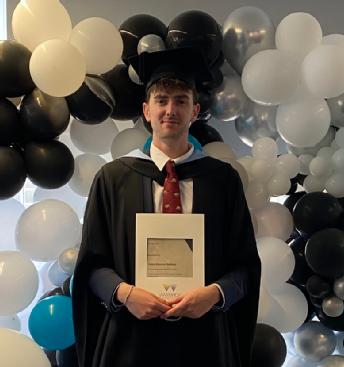 Pablo Brereton Rodrigo, a School of Engineering student at the University of Warwick, has won the Logistics Research Network Undergraduate Dissertation of the Year Award 2023, from the Chartered Institute of Logistics and Transport (CILT).
Pablo Brereton Rodrigo, a School of Engineering student at the University of Warwick, has won the Logistics Research Network Undergraduate Dissertation of the Year Award 2023, from the Chartered Institute of Logistics and Transport (CILT).
Pablo has recently completed his degree in Engineering Business Management. This undergraduate degree, although part of the School of Engineering, is led by the education team at WMG, University of Warwick.
Pablo’s dissertation entitled “Integrating supply chains in a turbulent, complex and uncertain era” was nominated by Professor Rob Thornton, Director of Undergraduate Programmes, at WMG. Pablo will be presented with his certificate and prize money at the Logistics Research Network Conference (LRN 2023) dinner and awards ceremony on the 7th September 2023 at Herriot-Watt University.
Professor Thornton explained: “Pablo’s dissertation was nominated for this award, for both academic excellence and the challenging topics addressed, which are highly relevant to today’s turbulent supply chains.”
Pablo said: “In discussing topics such as supply chain integration, I explored the challenging and turbulent landscape in today’s business environment and applied it to modern-day supply chains to reach the conclusion that forward-looking firms will leverage supply chain integration through self-contained, cross-functional and digitalised many-to-many structures.
“Directly applying skills learned during my placement year in supply chains, this project has further developed my personal growth and competencies relevant to the field. As such, I am immensely grateful to my university tutor, Alexa Kirkaldy, and all my friends and family for the continued support throughout the project.”
Pablo’s research was supervised by Alexa Kirkaldy, Associate Professor and Director of Academic Integrity at WMG who said: “Pablo defined his project idea and objectives after a year in industry and was excited to delve into the topic of supply chain integration, reaching depth and breadth usually expected at Master’s level. In addition Pablo was a delight to supervise and I wish him well in his career within the semiconductor industry.”
Professor Georgia Kremmyda, Head of Teaching and Deputy Head of School of Engineering said: “On behalf of the School of Engineering and the Education team, I would like to warmly congratulate you for your amazing achievement. The award strongly highlights your effort, commitment and dedication to your studies. You should take time to celebrate what you have accomplished.”
Professor David Towers, Head of School at the School of Engineering added: “This is quite an achievement and definitely something to capture on your CV!”
To find out more please visit: WMG - The University of Warwick
AI triaging of shrapnel wounds developed through UK and Ukraine partnership
Researchers in the UK and Ukraine are teaming up to develop artificial intelligence (AI) that will help treat those wounded by shrapnel.
Scientists at WMG at the University of Warwick and the Kharkiv National University of Radio Electronics (NURE) in Ukraine are developing AI software that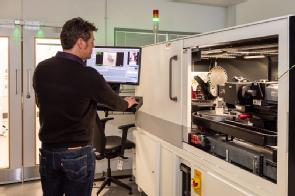 will help medics understand which patients require immediate treatment, due to life-threatening wounds that might not be obvious with the naked eye. The state-of-the-art technology enables users to feed data from a CT scan to a computer programme, which will help medics make quick decisions on which of the injured require most immediate treatment.
will help medics understand which patients require immediate treatment, due to life-threatening wounds that might not be obvious with the naked eye. The state-of-the-art technology enables users to feed data from a CT scan to a computer programme, which will help medics make quick decisions on which of the injured require most immediate treatment.
The project is one of 33 being discussed at the House of Lords this evening, to mark the one-year anniversary of the Twinning initiative – an institution-to-institution collaboration model which allows universities around the world to support their Ukrainian counterparts in real, concrete ways. It is funded by a £5m grant from Research England, administered by Universities UK International (UUKi).
Professor Mark Williams, WMG at the University of Warwick, said: “A huge problem for medics dealing with many severely injured people at the same time is the rapid identification of life-threatening injuries so they can prioritise who needs emergency surgery soonest. This is why we’re developing software with the team in Kharkiv to help address this issue. As well as being useful in other emergency situations such as earthquakes, the research is also applicable to doctors in trauma wards – already stretched by pressures experienced by the NHS – who need to triage patients quickly.
“For WMG’s part of the project, we will be creating phantom models using 3D imaging – replicas of human anatomy and shrapnel wounds. These will act as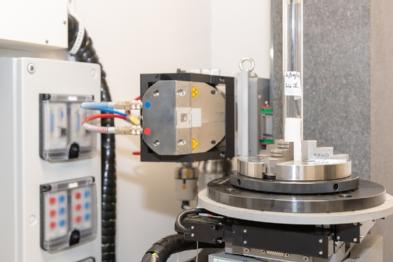 ‘test objects’, which experts in computer science can use to calibrate their technology and AI programme.
‘test objects’, which experts in computer science can use to calibrate their technology and AI programme.
“It is very exciting to be able to bring our expertise in Additive Manufacture at WMG to deliver a rapid solution to such an important humane need, allowing us to truly exploit the incredible advantages in speed of response and material complexity offered by this technology.”
Anastasiya Chupryna, coordinator of Radio Electronics-Warwick Allied Research and Development (REWARD) project at NURE said: “We would like to thank our partner Warwick University for supporting us in joint research activities. Within this project NURE and Warwick University will be able to solve extremely important problems. We believe that practical results of these projects will demonstrate significant impact and innovation solutions for society.”
WMG is considered the leading international role model for successful collaboration between academia and the public and private sectors by successive UK Governments. The WMG specific research is funded by a £179k grant from UUKi.
More here https://www.ukri.org/news/research-england-invests-in-uk-ukraine-university-twinning-scheme/
Ends
University of Warwick press office contact:
Annie Slinn
Communications Officer | Press & Media Relations |
Email: annie.slinn@warwick.ac.uk
Historic devolution agreement signed at WMG
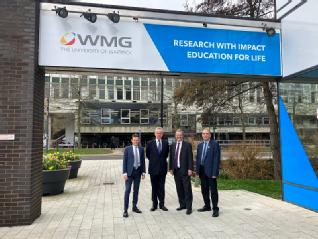 Professor Robin Clark, Dean of WMG at the University of Warwick, was pleased to welcome Levelling Up Secretary, Michael Gove and West Midlands Mayor, Andy Street on Monday (20 March).
Professor Robin Clark, Dean of WMG at the University of Warwick, was pleased to welcome Levelling Up Secretary, Michael Gove and West Midlands Mayor, Andy Street on Monday (20 March).
The Levelling Up Secretary and West Midlands Mayor signed a landmark deeper devolution deal for the region, marking a seismic shift in power, funding and responsibility from Whitehall to the region, at a ceremonial event that took place at WMG at the University of Warwick.
The deal announced in the Spring Budget puts more cash and power in the hands of local leaders to invest in the priorities that local communities truly care about, such as better bus and train services, skills and housing.
A new long-term funding settlement will enable the Mayor and local councils to plan for the long term, with certainty, and unlock tangible benefits for almost three million people living in the area.
Levelling Up Secretary Michael Gove said: “Visionary local leaders like Andy Street understand the needs of their areas better than decision-makers in Whitehall - that is why it is vital that we put more power and control in their hands.
“This deal goes further than we’ve ever gone before. It will give the Mayor unprecedented power to spend on local priorities and more control over transport, skills and housing – the things people truly care about.
“Today marks a bold new frontier in devolution in this country, and it’s fantastic to see the West Midlands right at the forefront.”
Stuart Croft, Vice Chancellor of the University of Warwick, which hosted the Levelling Up Secretary's visit, said: “It is good to be able to support the hard work across our region that has led to this agreement. We’re proud to play an active role in driving business growth and innovation in the West Midlands, whether that’s through our apprenticeship programmes, support for start-ups, or our close partnerships with industry across the region.
"Our world leading research into new green energy and technology is an example of where we’re not only developing new businesses, skills, and jobs, but also helping the UK to reach its net zero goals.”
Professor Robin Clark, Dean of WMG at the University of Warwick, added: “It was a pleasure to welcome the Levelling Up Secretary and the West Midlands Mayor, and we were proud to provide the location for the signing of this landmark devolution agreement.
“Before the official signing, I had the opportunity to show Mr Gove our 3xD driving simulator for autonomous vehicle research, and to explain more about WMG’s commitment to developing new engineering and manufacturing skills to help bridge the gap between academia and industry.”
Read more about the Deeper Devolution Deal.
